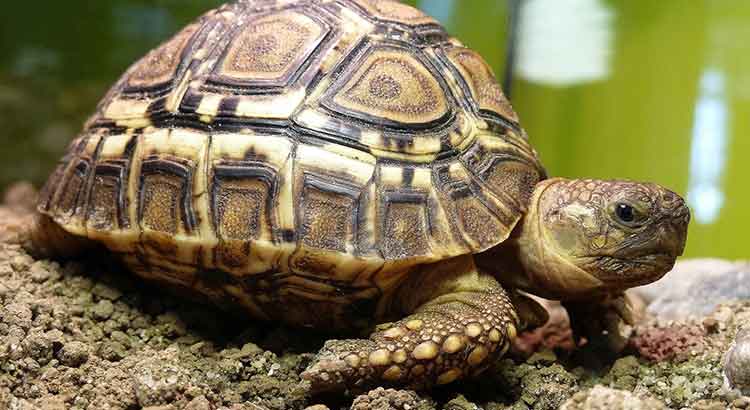
A long lived animal leopard tortoises when properly cared for can be one of the longest lived pets you will ever own. Where do leopard tortoises live.

In captivity leopard tortoises can live anywhere from 50 to over 100 years.
How long do leopard tortoises live. Leopard tortoises usually live 60 to 70 years but there are cases when a leopard tortoise can end up living more than 100 years. As you can see the amount of time a leopard tortoise will live is not very well defined. This begs the question.
How long do leopard tortoises live. The average lifespan of the leopard tortoise is about 80-100 years in captivity. In the wild the expected lifespan is similar as the leopard tortoise has few natural predators in its natural habitat.
Leopard tortoises live between 50 and 100 years in the wild. In captivity leopard tortoises can live anywhere from 50 to over 100 years. A long lived animal leopard tortoises when properly cared for can be one of the longest lived pets you will ever own.
Leopard Tortoise Care Sheet. In captivity leopard tortoises can live anywhere from 50 to over 100 years. Brumation allows leopard geckos to slow down reserve fat and burn very little energy so.
As for sounds in general tortoises are especially sensitive to sounds that are under 1000 Hz. Leopard tortoises can stay underwater for as long as 10 minutes. It is almost impossible for a predator to be a threat to these tortoises because of their enormous hard impregnable shell which gives complete protection to its legs and body.
What is the Lifespan of A Leopard Tortoise. An African Leopard Tortoise can live to be 50-100 years old. This depends on the dangers they face throughout their lifetime and if they can naturally survive that long without being eaten or killed.
Housing the Leopard Tortoise. If you live in a cold climate you may want to reconsider owning a leopard tortoise. These animals need hot temperatures year-round and have no tolerance for the cold.
Due to its size and need for sunlight leopard tortoises should be kept in a safe outside enclosure as much as possible. Forgive me if I am wrong but from what I understand the lifespan of a leopard tortoise is shorter in captivity. Since many wild tortoises will not.
My tortoise is just over 2 yrs now and in an outdoor enclosure 90 of the time. I live in South FL but know that the outside humidity varies and not above 80 most times. Leopard tortoise Lifespan Leopard Tortoises are long-lived tortoises that come to us from the dry desert areas of Northern Eastern and Southern Africa.
The Larger of the 2 subspecies the Giant South African Leopard tortoise as well as the Pardalis babcocki both live anywhere from 60-150 years. In the wild leopard tortoises do live between 50 and 100 years old. Thats if they can avoid the dangers that come with being young in a rather harsh world.
Tortoises are not exactly maternal and once the females have laid their eggs a clutch of 5-10 they move on. Any potential owner of a pet leopard tortoise needs to remember and consider carefully that these tortoises like many species of tortoise can live a very long time. Their lifespan in the wild is not well known but their average lifespan is likely between 80 and 100 years.
Where do leopard tortoises live. The leopard tortoise lives in the savannas and deserts of sub-Saharan Africa. It relies on low-lying vegetation as its main source of food.
What do leopard tortoises eat. The diet of the leopard tortoise consists of mixed grasses succulents and thistles. It is not uncommon for an African leopard tortoise to live anywhere from 80-100 years.
Leopards for sale should be thought of as a long term pet to say the least. When raised in the proper leopard tortoise habitat with proper UV lighting Substrate Humidity Temperatures and good quality food your baby leopard tortoise may outlive you. Your leopard tortoise will grow around 2 to 4 inches a year depending on temperature and diet so plan on providing a larger enclosure as your hatchling tortoises grow.
It is also interesting to note that in some populations females are larger than males and in other locations males are the larger sex.